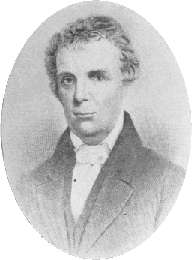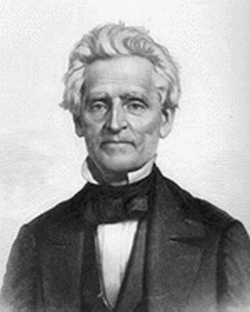Born again, or to experience the new birth, is a phrase, particularly in evangelicalism, that refers to "spiritual rebirth", or a regeneration of the human spirit from the Holy Spirit, contrasted with physical birth. It is a core doctrine of Methodist, Quaker, Baptist, Pentecostal and other evangelical Christian denominations.

The Christian Church is a mainline Protestant Christian denomination in the United States and Canada. The denomination started with the Restoration Movement during the Second Great Awakening, first existing during the 19th century as a loose association of churches working towards Christian unity, then slowly forming quasi-denominational structures through missionary societies, regional associations, and an international convention. In 1968, the Disciples of Christ officially adopted a denominational structure at which time a group of churches left to remain nondenominational.

Evangelicalism, also called evangelical Christianity, or evangelical Protestantism, is a worldwide trans-denominational movement within Protestant Christianity that maintains the belief that the essence of the Gospel consists of the doctrine of salvation by grace alone, solely through faith in Jesus' atonement. Evangelicals believe in the centrality of the conversion or "born again" experience in receiving salvation, in the authority of the Bible as God's revelation to humanity, and in spreading the Christian message. The movement has long had a presence in the Anglosphere before spreading further afield in the 19th, 20th and early 21st centuries.

Methodism, also called the Methodist movement, is a group of historically related denominations of Protestant Christianity which derive their doctrine of practice and belief from the life and teachings of John Wesley. George Whitefield and John's brother Charles Wesley were also significant early leaders in the movement. They were named Methodists for "the methodical way in which they carried out their Christian faith". Methodism originated as a revival movement within the 18th-century Church of England and became a separate denomination after Wesley's death. The movement spread throughout the British Empire, the United States, and beyond because of vigorous missionary work, today claiming approximately 80 million adherents worldwide.

The Second Great Awakening was a Protestant religious revival during the early 19th century in the United States. The Second Great Awakening, which spread religion through revivals and emotional preaching, sparked a number of reform movements. Revivals were a key part of the movement and attracted hundreds of converts to new Protestant denominations. The Methodist Church used circuit riders to reach people in frontier locations. The Second Great Awakening led to a period of antebellum social reform and an emphasis on salvation by institutions. The outpouring of religious fervor and revival began in Kentucky and Tennessee in the 1790s and early 1800s among the Presbyterians, Methodists and Baptists. The awakening brought comfort in the face of uncertainty as a result of the socio-political changes in America.

Restorationism is the belief that Christianity has been or should be restored along the lines of what is known about the apostolic early church, which restorationists see as the search for a purer and more ancient form of the religion. Fundamentally, "this vision seeks to correct faults or deficiencies by appealing to the primitive church as a normative model."

The Restoration Movement is a Christian movement that began on the United States frontier during the Second Great Awakening (1790–1840) of the early 19th century. The pioneers of this movement were seeking to reform the church from within and sought "the unification of all Christians in a single body patterned after the church of the New Testament."

Alexander Campbell was a Scots-Irish immigrant who became an ordained minister in the United States and joined his father Thomas Campbell as a leader of a reform effort that is historically known as the Restoration Movement, and by some as the "Stone-Campbell Movement." It resulted in the development of non-denominational Christian churches, which stressed reliance on scripture and few essentials. Campbell was influenced by similar efforts in Scotland, in particular, by James and Robert Haldane, who emphasized their interpretation of Christianity as found in the New Testament. In 1832, the group of reformers led by the Campbells merged with a similar movement that began under the leadership of Barton W. Stone in Kentucky. Their congregations identified as Disciples of Christ or Christian churches.
Nondenominational Christianity consists of churches which typically distance themselves from the confessionalism or creedalism of other Christian communities by not formally aligning with a specific Christian denomination.
Churches of Christ are autonomous Christian congregations associated with one another through distinct beliefs and practices based on their interpretation of the Bible. Represented in the United States and one of several branches across the world, they believe in using only biblical precedents for their doctrine and practices, citing examples from the early Christian church as described in the New Testament. They typically reject doctrinal writings that disagree with their interpretations, and all written religious creeds; the churches of Christ thus identify themselves as being nondenominational.
The group of Christians known as the Christian Churches or Churches of Christ are congregations within the Restoration Movement that have no formal denominational affiliation with other congregations, but still share many characteristics of belief and worship. Churches in this tradition are strongly congregationalist and have no formal denominational ties, and thus there is no proper name that is agreed to apply to the movement as a whole. Most congregations in this tradition include the words "Christian Church" or "Church of Christ" in their congregational name. Due to the lack of formal organization between congregations, there is a lack of official statistical data, but the 2016 Directory of the Ministry documents some 5000 congregations in the USA and Canada; some estimate the number to be over 6,000 since this directory is unofficial.

Thomas William Harpur (1929–2017), known as Tom Harpur, was a Canadian biblical scholar, columnist, and broadcaster. An ordained Anglican priest, he was a proponent of the Christ myth theory, the idea that Jesus did not exist but is a fictional or mythological figure. He was the author of a number of books, including For Christ's Sake (1986), Life after Death (1996), The Pagan Christ (2004), and Born Again.

Barton Warren Stone was an American evangelist during the early 19th-century Second Great Awakening in the United States. First ordained a Presbyterian minister, he and four other ministers of the Washington Presbytery resigned after arguments about doctrine and enforcement of policy by the Kentucky Synod. This was in 1803, after Stone had helped lead the mammoth Cane Ridge Revival, a several-day communion season attended by nearly 20,000 persons.
The Christian Connection was a Christian movement in the United States of America that developed in several places during the late 18th and early 19th centuries; it was made up of secessions from several different religious denominations. It was influenced by settling the frontier as well as the formation of the new United States and its separation from Great Britain. The Christian Connection claimed to have no creed, instead professing to rely strictly on the Bible.

The Evangelical Christian Church(Christian Disciples) as an evangelical Protestant Canadian church body in North America (2004) can be traced to the formal organization of the Christian Church in 1804, in Bourbon County, Kentucky under the leadership of Barton Warren Stone (1772–1844). The Stone Movement later merged with the efforts of Thomas Campbell (1772–1854) and his son Alexander Campbell (1788–1866) to become the Restoration Movement that gave birth to the Churches of Christ (Non-Instrumental), the Christian churches and churches of Christ, the Churches of Christ (non-institutional), and the Disciples of Christ. The Evangelical Christian Church as a separate group within the Restoration tradition was reorganized in 2001. The Evangelical Christian Church's national office in Canada is in Waterloo, Ontario.
The World Convention of Churches of Christ is a Christian world communion that links Restoration Movement churches known by a range of names including Christian Churches, Churches of Christ and Christian Church. The first Global Gathering of the World Convention was held in Washington, D.C. in 1930 at the initiative of evangelist Jesse Bader. The convention continues to organize regular international gatherings. The 19th Global Gathering was held in Damoh, India, January 12–15, 2018 and the next was scheduled for Manzini, Swaziland but postponed because of "internal tensions". Between these events, the World Convention seeks to build effective relationships among its member churches and promote Christian unity across the world.

"Raccoon" John Smith was an early leader in the Restoration Movement. His father, George Smith was of German ancestry, and may have been born in Germany, while his mother, Rebecca Bowen Smith, was of Welsh and Irish ancestry. He played a critical role uniting the movement led by Thomas and Alexander Campbell with the similar movement led by Barton W. Stone and in spreading the message of the movement over much of Kentucky.
The Congregational Christian Churches in Canada is an evangelical, Protestant, Christian denomination, headquartered in Simcoe, Ontario. It is a member of the World Evangelical Congregational Fellowship.

Michael A. G. Haykin is the Professor of Church History and Biblical Spirituality and Director of The Andrew Fuller Center for Baptist Studies at the Southern Baptist Theological Seminary.

Christian revivalism is increased spiritual interest or renewal in the life of a church congregation or society, with a local, national or global effect. This should be distinguished from the use of the term "revival" to refer to an evangelistic meeting or series of meetings. Proponents view revivals as the restoration of the church itself to a vital and fervent relationship with God after a period of moral decline.











